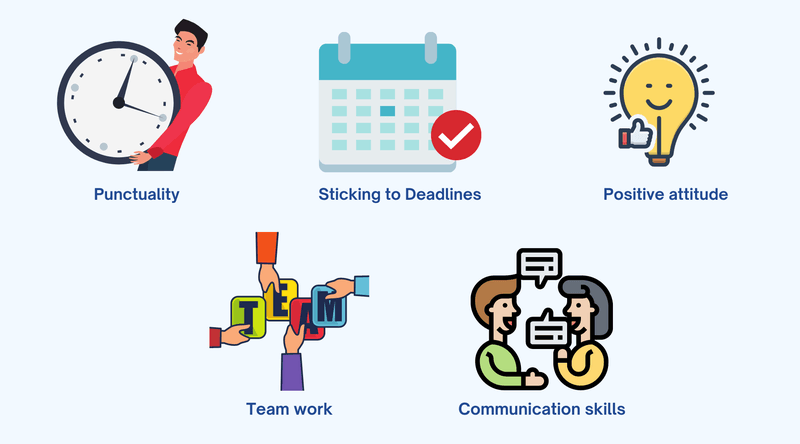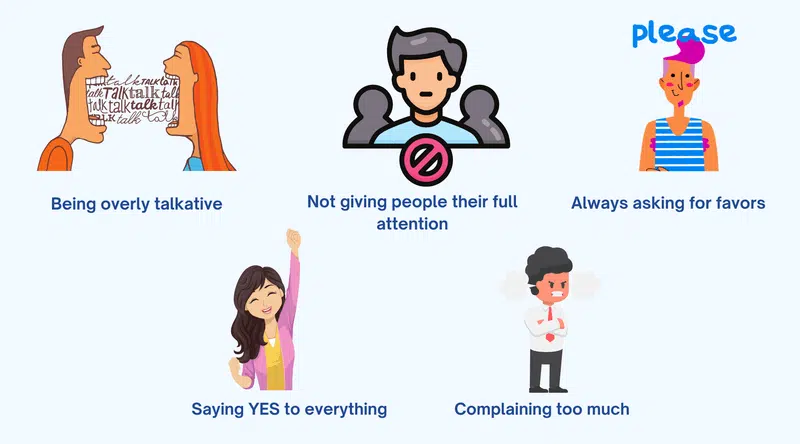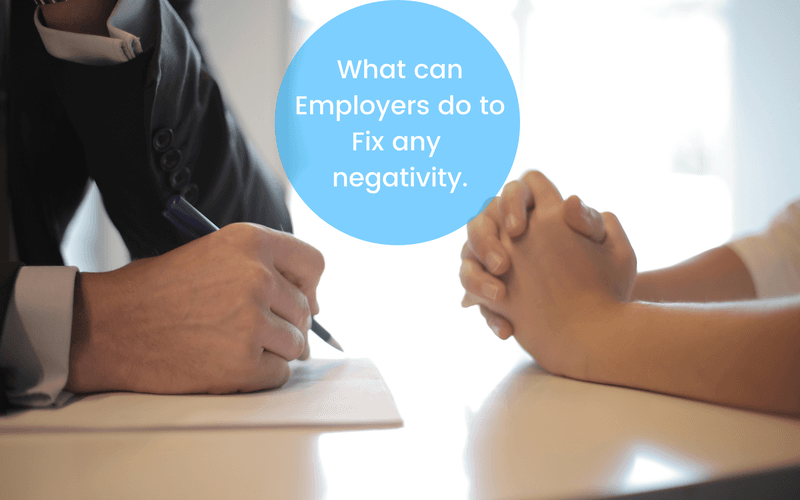Work is where we spend most of our adult lives, and the amount of time spent at the workplace is so significant that it becomes essential that positive colleagues surround us. A conducive work environment can do wonders for a person’s wellbeing. To ensure this, it is best to ask oneself the vital question – am I annoying?
Here is a brief summary of the article, if you prefer, jump to the topics you’re most interested in:
- What Does Annoying Mean?
- What Are Positive Attributes of an Employee?
- Am I Annoying? What Are the Signs?
- How to Stop Being Annoying?
- What Can Employers Do to Help You Being Less Annoying?
What Does Annoying Mean?
To be annoying means you make someone feel irritated or angry at your behavior. Sometimes is difficult to identify an annoying attitude and it’s necessary to pay attention to other reaction to understand if you’re being annoying.
To be annoying can happen with people, things, or situations. It can be someone on your workspace or someone’s iPhone that rings all the time, or a meeting that you cannot stand anymore.
The origin of the word annoying is the Latin inodiare, or to hate, detest, loathe.
What Are Positive Attributes of an Employee?

Now that you have raised this question, let us get to the answer together. The key here is to have an honest, open conversation with yourself. There are specific attributes that people possess that are considered healthy for a workplace.
Punctuality
Being punctual is one of the foremost traits of a good employee. The answer to the question- am I annoying shall be affirmative if one does not show up on time in the office. Frequent late coming is a sign of tardiness that no one takes well at the workplace, and it annoys your colleagues to no end and dents one’s professional reputation.
Sticking to Deadlines
Managing one’s time well and accomplishing assigned tasks by the scheduled deadline is a hallmark of reliability. Consequently, such employees are bound to get marquee projects that will ensure the northward movement of their career trajectory.
Positive Attitude
Ups and downs are an integral part of business and personal life. Here is where employees must step in and look out for one another, and this goes a long way in ensuring high morale and productivity at the workplace.
Team Work
Any workplace setting requires a person to work in collaboration, often with multi-disciplinary teams. To succeed and achieve work goals in this environment, one has to be adaptable, responsible, and most importantly, supportive of other team members.
Communication Skills
Strong communication skills play a significant role when answering the question – am I annoying. This is so because communication forms the bedrock of any job. A person may be required to communicate with various stakeholders such as team members, superiors, vendors, or customers. Communication skills consist of being open to new ideas, excellent listening skills, and being professional.
Am I Annoying? What Are the Signs?

Now that we have established the ideal qualities of a good employee, let us look at some indicators of annoying co-workers. All of us know someone we would rather avoid running into or working with at the office. Here is a helpful list of red flags to spot annoying co-workers who make life difficult for everyone.
Being overly talkative
It is lovely to have water cooler conversations at the office, and they help you get to know your colleagues better. However, talking too much during office hours and disturbing your co-workers is not acceptable.
One must learn to read visual cues and non-verbal signs in such a situation. If your colleagues are constantly looking at their computers or furiously typing away while talking, then you must let them get back to work.
Not giving people their full attention
Looking busy is something that is constantly glorified in today’s times. However, not devoting your complete attention when someone is talking to you is criminal, and it is only courteous to put aside whatever you are doing or tell the other person to come back later.
Constantly Asking for Favors
Organizations have processes in place for a reason, and they help establish a time frame and set expectations concerning the completion of a task. Emergencies are understandable, but they happen once in a while. Repeatedly pressurizing people to prioritize your work will undoubtedly put you on top of the am I annoying list.
Saying yes to everything
You are a person who has just joined, or maybe you have a new manager. In an apparent attempt to impress, you say yes to everything that comes your way. Initially, this might work and make you feel good about yourself. But beware, stretching oneself to the limit to earn a few brownie points is not recommended, and you will end up exposing your poor time management skills and lack of tact.
Complaining too much
Cribbing about an annoying manager or co-worker is a rite of passage at the workplace. But be careful not to overdo it. Grumbling all the time about traffic or other colleagues spreads negativity and is not advised.
How to Stop Being Annoying?

We have come to the next part of our journey. Now that we have identified some traits of an annoying co-worker, the question is, how to resolve the situation? Well, we have a few tips that can assist in fixing your annoying habits.
Avoid Gossip
Bottling your emotions or, worse, venting to a colleague about co-workers may act as a quick fix. But this is by no means a long-term solution to resolve issues at the workplace. Gossiping or spreading rumors is not going to enhance your reputation and will most likely backfire.
Assess if their behavior impacts you
We all have co-workers who are distracting and make work real displeasure. Focusing on them consumes our time and emotion, and it can also derail our chances of professional success. This makes it essential to decide – can annoying people just be ignored? Or is their behavior such that you need to talk to them about it? Imbibing a certain level of acceptance is always helpful.
Don’t get too involved with the person.
It is always good to remind oneself that not everyone at the office is their best friend. Be courteous and professional and maintain a polite distance from the person in question.
Cultivate Empathy
Empathy or compassion is the cornerstone of a happy life. Whenever you are bothered by a person in your “am I annoying” list. Ask yourself the question, could he be going through some personal issues that I know nothing about? Lack of understanding of cultural differences could also lead to problems at the workplace.
Set Boundaries
There could be instances where you end up working with harmful or toxic employees on a project. In such cases, the best thing to do is maintain a professional relationship and ensure that conversations don’t deviate much from the task at hand.
Develop coping mechanisms
It is not possible to change the behavior of people overnight. More importantly, that is not your job. Sometimes, avoiding annoying employees could be as simple as switching desks or taking up mindfulness exercises like meditation or yoga. One should also try to lose any grudges against fellow employees, and this is because forgiveness is the fastest key to freedom. Any pent feeling of resentment is only harmful to us.
What Can Employers Do to Help You Being Less Annoying?

Most employees can deal with annoying co-workers workers. But sometimes, the situation gets out of hand, and managers have to get involved. This is not a pleasant situation but one that needs to be handled effectively, nonetheless. Here are a few steps managers can look at to deal with negative employees.
Make the employee feel heard.
When an employee is constantly ranting about the workplace, talking to him and understanding his concerns becomes essential. Try to put yourself in the other person’s shoes and make them feel better. It also helps to convey to him the adverse effects his attitude has on the overall office environment.
Don’t make the issue a personal one.
When an employee is talking about his frustrations at the office, one must realize that they are not his grudges but rather some issues at work.
Ask if everything is OK.
Sometimes, the cause of disgruntled behavior may lie outside the office, such as the loss of a loved one, financial issues, health problems, and so on. Offering the necessary support is the appropriate course of action in these circumstances.
Positive Interactions
Look to reinforce positive interactions and appreciate contributions from the employee.
Follow through regularly
Sometimes, employees start showing signs of improvement and then tend to slip back into their old habits. To avoid this, you need to remind the person of the consequences of continued bad behavior and hold him accountable.
Termination
Termination of employees is usually the last resource, and it is a highly unpleasant and unfortunate scenario. If you have had multiple conversations with the employee, tried to understand his mindset and situation, and given him opportunities with no results, then termination is the only option left.
In Conclusion
Annoying employees, just like annoying people, are part and parcel of every workplace. From co-workers to managers, the best course of action is to avoid confrontation as much as possible.
If you feel like it, read through the checklist again to ensure that you don’t display any of the negative habits discussed above. For all you know, you might be on the top of your colleague’s “am I annoying” checklist.

Ranu Kumari is a Professional Writer and a Marketing enthusiast who currently runs her own Marketing Consultancy, LatitudeBOX. She has written promotional articles for multiple brands and has published her work in Scopus indexed journals. She is passionate about expressing her thoughts and ideas to connect with her readers in a voice that they understand.
